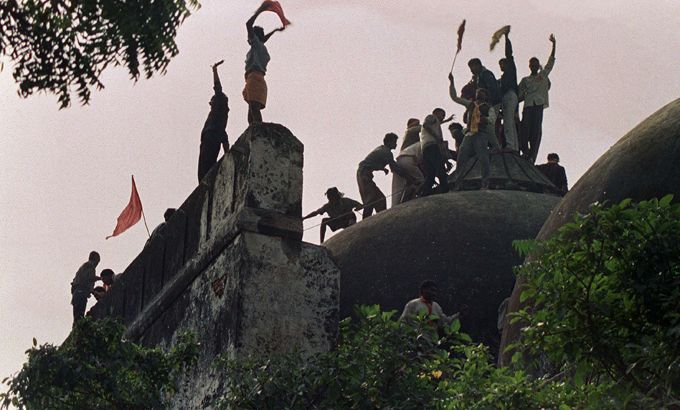Leading BJP figures to face trial in Babri mosque case
Members of Modi’s governing BJP face criminal conspiracy charges over the 1992 destruction of Babri mosque.

India’s Supreme Court has ordered that the cofounder of the ruling Bharatiya Janata Party, LK Advani, and other leaders be tried for criminal conspiracy in the demolition of a 16th century mosque about 25 years ago.
The Babri Masjid in Ayodhya, in the northern Uttar Pradesh state, was pulled down by Hindu activists on December 6, 1992, leading to widespread riots in which more than 2,000 people died.
Keep reading
list of 4 itemsIndia’s electoral bonds laundry: ‘Corrupt’ firms paid parties, got cleansed
Will Narendra Modi serve another term as India’s prime minister?
‘Fascism will not work in India’ says wife of arrested Modi critic
Advani, 89, along with Murli Manohar Joshi and Uma Bharti, has previously been charged with making inflammatory speeches which incited the activists to demolish the structure.
The Supreme Court’s ruling on Wednesday came after a lower court dropped the charges brought against them by India’s Central Bureau of Investigation (CBI), kicking off a series of appeals and counter appeals.
“We have allowed the CBI appeal against the Allahabad High Court judgment with certain directions,” the Press Trust of India news agency quoted the Supreme Court judges as saying.
The court ruled that the leaders will face the more serious charge of conspiracy and be tried by a special court in Lucknow dealing with the actual demolition of the mosque, Zafaryab Jilani, a lawyer for the petitioner, said on Wednesday.
“The judges set aside previous court orders that dropped conspiracy charges against these leaders. It accepted appeals by the prosecution and on our behalf to revive the charges,” Jilani said.
Daily hearings ordered
While combining the trials, the Supreme Court ordered daily hearings to ensure the verdict is delivered in two years’ time.
“There are many witnesses in the case. We hope the guilty are punished,” Jilani, who is also the convenor of the Babri Masjid Action Committee, said.
The Supreme Court ruled that a fourth senior BJP politician, Kalyan Singh, who was chief minister of Uttar Pradesh at the time of the incident, should face criminal conspiracy charges.
![Ayodhya in Uttar Pradesh has been a flashpoint for religious tensions [Cathal McNaughton/Reuters]](/wp-content/uploads/2017/04/57995f304e224f61bee36907c27cb5e6_18.jpeg)
His trial, however, will be delayed until his stint as governor of Rajasthan state is over because the position gives him immunity from prosecution.
The site where the Babri mosque was demolished has remained a flashpoint of religious tensions for decades.
Some Hindus say a temple to their god Ram predated the mosque and want to build a temple at the site, while Muslim groups want a new mosque.
Some in the BJP, which recently won elections in Uttar Pradesh, want to build a temple to Ram on the ruins of the razed Babri mosque – an idea that horrifies the state’s significant Muslim minority.
Presidential prospects
Indian new media reports said the charges would ruin the chances of Advani, a former prime minister, becoming India’s next president when the role becomes vacant later this year.
He was present on the day of the demolition. The ensuing nationwide riots and deaths came to define his political career.
However, in a later interview with the BBC, he said the incident had hurt him “tremendously” and should never have happened.
![With the ruling, Advani has suffered a blow to his chances of becoming president [Reuters]](/wp-content/uploads/2011/10/2011101120345194734_20.jpeg)
There was no immediate reaction from the BJP, to which Narendra Modi, India’s prime minister, belongs.
However, the opposition Congress party said that the BJP had “tried every trick in the book” to ensure that Advani, Bharti and Joshi did not face charges.
“What they [Supreme Court judges] have said today means there’s clinching evidence that needs to be now argued out in the court,” said Sanjay Jha, a Congress spokesman.
The mosque demolition case has been languishing in India’s sluggish legal system for almost 25 years.